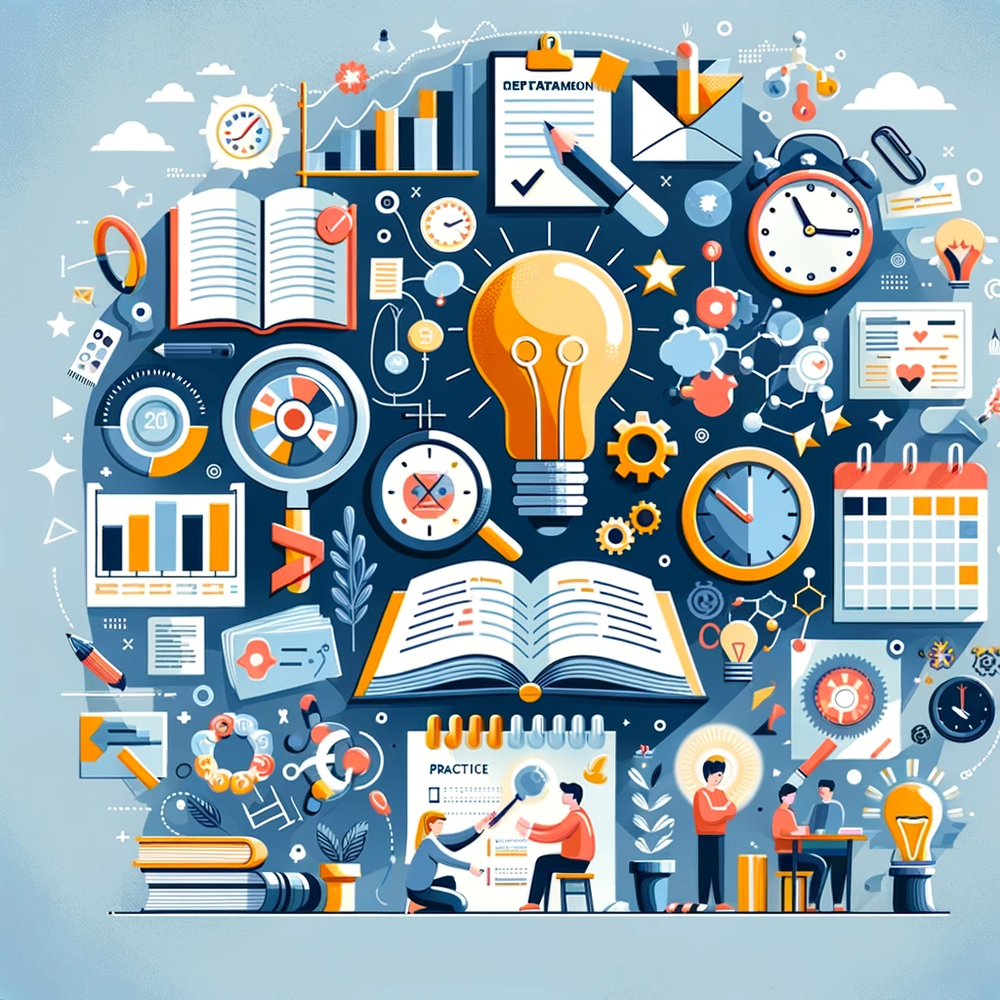
The Fullest Guide to Test Prep: Proven Strategies and Tools for Effective Study
Test preparation is a crucial aspect of academic success, and employing effective study strategies and tools can significantly enhance your performance. Whether you're preparing for standardized exams, final exams, or any other assessment, a well-rounded approach is key. This guide will provide a comprehensive overview of test preparation, emphasizing strategies and tools to help you excel in your studies.
Understanding the Test
Before diving into your study routine, it's essential to understand the format, content, and structure of the test you're preparing for. Obtain any available official study guides, syllabi, or past exam papers. This will give you insights into the types of questions, the weighting of different topics, and the overall structure of the test.
Develop a Study Plan
Organizing your study time is crucial for effective test preparation. Create a realistic and well-structured study plan that allocates time for each subject or topic. Be sure to include breaks to prevent burnout. Consistency is key, so try to stick to your schedule as closely as possible.
Active Learning Strategies
Engage in active learning to reinforce your understanding of the material. Instead of passively reading, try techniques such as:
- Flashcards: Create flashcards with key concepts on one side and details or definitions on the other. Quiz yourself regularly to reinforce memory.
- Teaching Others: Explain concepts to friends, family, or even imaginary students. Teaching others helps solidify your understanding of the material.
- Practice Problems: For subjects like math or science, focus on solving practice problems. This not only reinforces concepts but also enhances problem-solving skills.
- Mind Mapping: Create visual representations of concepts and their interconnections. Mind maps can help you see the bigger picture and remember information more effectively.

Utilize Study Tools
Take advantage of various study tools that can enhance your learning experience:
- Online Platforms: Platforms like Testudy, Khan Academy, and Coursera offer a wide range of educational resources, including video lectures, quizzes, and interactive exercises.
- Study Apps: Use apps designed for specific subjects or general study purposes. Apps like AnkiDroid, Forest, and Todoist can help with flashcards, focus, and task management.
- Digital Flashcards: Platforms like Quizlet or Anki allow you to create digital flashcards that you can access anywhere. These apps often incorporate spaced repetition algorithms for more efficient memorization.
- Note-Taking Tools: Consider using digital note-taking tools such as Microsoft OneNote or Evernote. These platforms enable easy organization and quick access to your study materials.
Time Management for Test Success
- Practice Time Management
Many tests are time-constrained, so practicing time management is crucial. When practicing with past exams or sample questions, set a timer to simulate real test conditions. This not only helps you gauge your readiness but also improves your ability to answer questions within the allocated time.
- Collaborate with Peers
Study groups can be highly beneficial for test preparation. Collaborating with peers allows for the exchange of ideas, explanations, and diverse perspectives. Teaching and discussing concepts with others can deepen your understanding and identify areas where you may need further clarification.
- Prioritize Weak Areas
Identify your weaker areas early in the preparation process. Allocate more study time to these subjects or topics, ensuring a balanced understanding of the entire curriculum. Regular self-assessment can help pinpoint areas that need extra attention.
- Take Care of Yourself
Don't underestimate the importance of self-care during the preparation period. Ensure you get enough sleep, maintain a healthy diet, and engage in physical activities. A well-rested and healthy mind is better equipped to handle the challenges of test day.
- Simulate Test Conditions
As the test date approaches, simulate the actual testing environment. Practice in a quiet space with minimal distractions and adhere to the same time constraints. Familiarizing yourself with the conditions helps reduce anxiety and improves your ability to perform under pressure.
Advanced Study Techniques
Dual Coding Theory: Enhancing Learning Through Visuals
Dual Coding Theory suggests that combining verbal and visual information can enhance learning. Incorporate visual aids such as diagrams, charts, and graphs into your study materials. This not only appeals to different learning styles but also reinforces understanding through multiple channels.
- Metacognition: Thinking About Your Thinking
Develop metacognitive skills by reflecting on your learning process. Ask yourself questions like: What strategies are most effective for me? How can I improve my study techniques? Being aware of your cognitive processes can lead to more efficient and targeted studying.
In-Depth Analysis of Study Tools
- Advanced Features of Study Apps
Explore advanced features of study apps. For instance, some apps offer adaptive learning algorithms that tailor the content based on your strengths and weaknesses. Dive into the settings of these apps to maximize their effectiveness in addressing your specific needs.
- Creating Interactive Study Materials
Take your digital flashcards to the next level by incorporating multimedia elements. Embed videos, images, or links to external resources that provide additional context. This adds an interactive dimension to your study materials, making the learning experience more engaging.
- Collaborative Note-Taking Tools
If you're part of a study group, leverage collaborative note-taking tools. Google Docs and Microsoft Teams allow real-time collaboration, enabling group members to contribute simultaneously. This fosters a sense of collective understanding and shared knowledge.
Advanced Time Management Strategies
- Pomodoro Technique Variations
While the Pomodoro Technique involves 25-minute focused study sessions, experiment with variations. Some individuals find a 50/10 or 90/20 split more suitable. Adjust the intervals to match your attention span and productivity levels.
- Time Blocking for Comprehensive Preparation
Implement time blocking to allocate specific time slots for different subjects or skill areas. This technique ensures a balanced study routine and prevents overemphasis on one topic at the expense of others.
Harnessing Technology for Collaboration
- Virtual Study Groups and Forums
Explore online forums and virtual study groups dedicated to the exam or subject you're preparing for. Platforms like Reddit, Quora, or specialized study group websites provide opportunities to discuss concepts, share resources, and gain insights from a broader community.
- Virtual Reality (VR) for Immersive Learning
Consider using VR applications for subjects that benefit from immersive experiences. Virtual labs, historical recreations, or simulations can provide a unique and engaging way to deepen your understanding of complex topics.

Tailoring Self-Care to Exam Preparation
- Mindfulness Meditation for Stress Reduction
Incorporate mindfulness meditation into your daily routine to manage stress and enhance focus. Apps like Headspace or Calm offer guided meditations specifically designed to alleviate exam-related anxiety.
- Balancing Physical Exercise with Study Sessions
Explore the concept of active rest by incorporating short bursts of physical exercise into your study breaks. Physical activity has been shown to boost cognitive function and can contribute to a more productive study session.
Case Studies and Success Stories
Share case studies or success stories of individuals who employed these strategies and tools effectively in their test preparation. Real-life examples can provide inspiration and practical insights for readers.
FAQs and Troubleshooting
Address common questions and concerns related to test preparation. Provide troubleshooting tips for challenges like procrastination, lack of motivation, or difficulty in retaining information.
Review and Reflect
In the final days leading up to the test, review key concepts and take time to reflect on your preparation. Identify any last-minute gaps in your knowledge and address them promptly. Avoid cramming the night before the test; instead, focus on relaxing activities to ensure you're in the best mental state.
In conclusion, effective test preparation requires a combination of strategic planning, active learning, and the use of appropriate tools. By understanding the test, developing a study plan, utilizing active learning strategies, and incorporating study tools, you can enhance your performance and approach test day with confidence. Remember to prioritize self-care and maintain a positive mindset throughout the preparation process.





